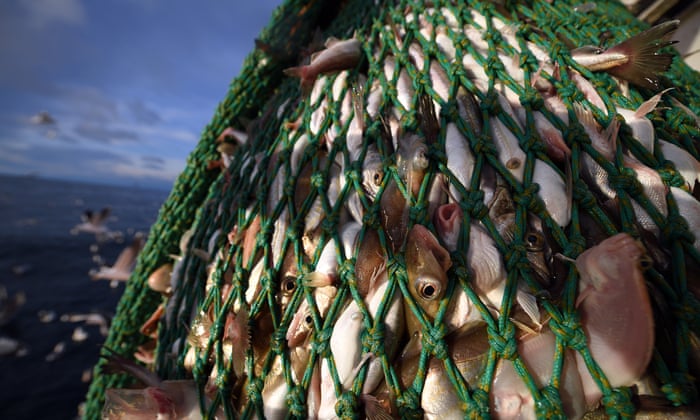Warming Seas, Fish Scarcity
"That four percent decline [the figure arrived at through the study of declining fish populations attributable to warming seas] sounds small, but it's 1.4 million metric tons of fish from 1930 to 2010."
"And that region [northeast Atlantic Ocean and the Sea of Japan where a much steeper decline was noted] is home to some of the largest-growing human populations and populations that are highly dependent on seafood."
"We hope that this highlights the importance of accounting for the fact that climate change is driving shifts in productivity."
"Overfishing is a one-two punch: it makes populations more vulnerable to ocean warming and rebuilding overfished populations is hindered by warming,"
"We recommend that fisheries managers eliminate overfishing, rebuild fisheries and account for climate change in fisheries management decisions."
"Policymakers can prepare for regional disparities in fish catches by establishing trade agreements and partnerships to share seafood between winning and losing regions."
Chris Free, researcher, University of California, Santa Barbara
 |
| Fishing in the North Sea off Shetland, Scotland, where fish stocks have declined. Photograph: Jeff J Mitchell/Getty Images |
"We were stunned to find that fisheries around the world have already responded to ocean warming."A new study published in the journal Science warns that climate change has already impacted seafood catches around he world, that fish populations are declining in response to warming oceans, placing a food source and fishing income at risk, affecting millions of people worldwide. In some coastal areas and island nations fish represent 70 percent of the animal protein people consume. Elsewhere, around the world, fish make up 17 percent of the intake of animal protein.
"These aren’t hypothetical changes sometime in the future."
Malin Pinsky, study co-author, associate professor, Rutgers’ Department of Ecology, Evolution, and Natural Resources
"Fish populations can only tolerate so much warming, though."
"Many of the species that have benefited from warming so far are likely to start declining as temperatures continue to rise."
Olaf Jensen, senior study author, associate professor, Rutgers’ Department of Marine and Coastal Sciences
 |
| Haddock in the North Sea are among the climate change "losers" as a result of warming ocean temperatures. Credit: NEFSC/NOAA |
Climate change is steadily impacting marine life where oceans have absorbed 93 percent of heat trapped by greenhouse gases. Ocean temperatures, according to a study published in January, were increasing faster than previous estimates suggested they would. Fish are consequently migrating to other areas more conducive to their existence since high ocean temperatures can kill fish, along with the food those fish depend upon.
In the northeast Atlantic ocean where Atlantic cod proliferate, there was a 34 percent decline in sustainable catches. In other regions representing a quarter of the world's fishing populations, no significant changes were noted. Fish had, however, expanded their range in roughly a quarter of the studied regions so that off the Atlantic Coast of the United States catches of black sea bass have increased by six percent; a rare reversal of the shrinking fish habitat.
 |
| Black sea bass are one of the climate change "winners" that have seen their productivity increase with warming ocean temperatures. Credit: Orion Weldon |
Over the eight decades that the study encapsulates, more populations of fish declined than increased. This new research studied historical data to determine that the declines which previous studies predicted would lead to fewer ocean fish in the future, had already begun to occur noticeably. "This is going to be one of those groundbreaking studies that gets cited over and over again", noted Trevor Branch, associate professor, University of Washington School of Aquatic and fishery Sciences.
In colder parts of the ocean, fish populations tended to fare more favourably; cold fails to impact deleteriously on fish the way warming does. The researchers found less detail in the data they studied relating to the tropics, leading them to the realization that in those regions fish losses may have been steeper than in regions the study focused on. When warm ocean areas are overfished this adds to the vulnerability of the stock, since fish are hindered in their reproduction.

Labels: Climate Change, Fish Stocks, Nature, Ocean Warming, Research

<< Home